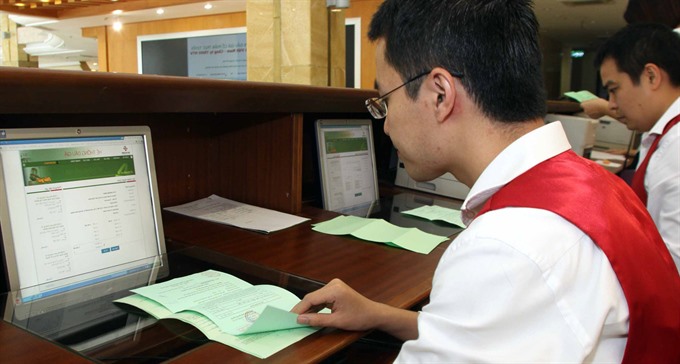Vietnamese shares kept falling on Monday, weighed down by large-cap stocks as investors remained quiet amidst the lack of supporting news among all businesses.

Vietnamese shares kept falling on Monday, weighed down by large-cap stocks as investors remained quiet amidst the lack of supporting news among all businesses.
The benchmark VN-Index on the HCM Stock Exchange dropped 3.34 per cent, or more than 32 points, to close at 931.75 points, hitting its lowest level since December 15, 2017.
The VN-Index had kept rising substantially since December 15, 2017 to hit its all-time high of 1,204.33 points on April 9, 2018. But since that historical landmark, the benchmark index has lost total 22.6 per cent.
Last week, the VN-Index decreased by total 7.37 per cent.
The minor HNX Index on the Ha Noi Stock Exchange tumbled 6.21 per cent, or 7.11 points, to end at 107.37 points, totalling a three-day decline of 9.1 per cent.
The northern market index was down 5.6 per cent in the previous trading week.
Nearly 288 million shares were traded on the two local exchanges, worth VND7 trillion (US$314.8 million).
Monday’s trading liquidity figures were up 48 per cent in volume and 35 per cent in value compared to the previous week’s daily average numbers.
Large-cap stocks were still the most important factor weighing the markets down, with the large-cap VN30 Index dropping 4.09 per cent to 898.00 points at the end of the day.
The two stock exchanges were covered with declining stocks, which outnumbered gainers by a 5:1 ratio (408 declining stocks versus 81 gaining ones). That included 28 losers in the VN30 basket.
Eighteen of the 20 sectors in the stock market saw share prices fall, with the worst performing including banking, energy, securities and retail. Those sector indices lost at least 6.2 per cent, data on vietstock.vn showed.
According to Nguyen Ngoc Lan, head of the brokerage division at Agribank Securities Company (Agriseco), the markets will likely continue their current downtrend as one of the driving forces is investors’ weak sentiment, which has been affected by rising tensions around the globe, foreign investors’ net sell value and bad news about local firms’ business activities.
In addition, investors have chosen to step aside after having failed several times to pick the markets up from their short-term bottom fishing, even though they have enough cash, because the markets are showing little signals of recovery, Lan said.
Bao Viet Securities Co (BVSC) said in its daily report that despite an improvement of trading liquidity, “bottom-fishing demand was too weak to support the overall market” and local stocks are “likely to stay on downtrend in the short-term.”
“Investors have turned pessimistic and panicked after the market continuously broke down major supports. Selling pressure may continue to rise dramatically in the next sessions,” it said.
However, BVSC expected bottom-fishing demand will be activated when the market drops to the support zone around 900. — VNS





